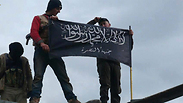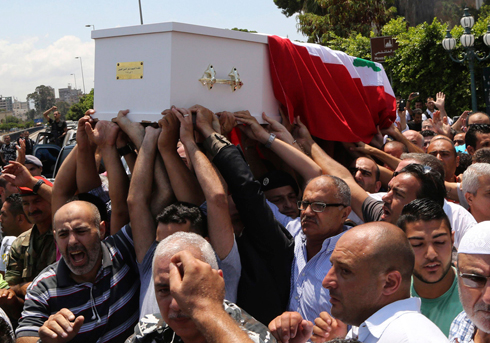
Syrian jihadist rebels.
צילום: AP
Christians arm as Mideast perils mount
Across Middle East, Christian communities feel their survival is now at stake, threatened by militants of Islamic State group rampaging across Iraq and Syria, but also in Lebanon.
Every day around sunset, dozens of residents of this small Lebanese Christian village on the border carry their automatic rifles and deploy on surrounding hills, taking up positions and laying ambushes in case Muslim extremists from neighboring Syria attack.

"We all know that if they come, they will slit our throats for no reason," said one villager as he drove through the streets of Qaa, an assault rifle resting next to him.

The funeral of a Lebanese Army officer killed recently in a jihadist raid across the border with Syria. (Photo: Reuters) (צילום: רויטרס)
For months, Lebanese Christians have watched with dread as other Christians flee Islamic extremists in Syria and Iraq, fearing their turn will come next. Fears multiplied after militants from Syria overran a border town last month, clashing with security forces for days and killing and kidnapping Lebanese soldiers and policemen.
Now, for the first time since the Lebanese civil war ended in 1990, Lebanese Christians are rearming and setting up self-defense units to protect themselves, an indication of the growing anxiety over the expanding reach of radical Islamic groups.
Across the Middle East, Christian communities as old as the religion itself feel their very survival is now at stake, threatened by militants of the Islamic State group rampaging across Iraq and Syria.
In Iraq, thousands of Christians have fled their homes after they were made to choose between leaving, converting to Islam or facing death. For the first time in centuries, Iraq's Ninevah region and the provincial capital of Mosul have been emptied of Christians. After they left, the militants spray-painted their houses with the letter "N'' for "Nasrani" - an archaic term used to refer to Christians - marking the homes as Islamic State property.
In Syria, thousands of Christians have been displaced during its three-year conflict. Christian towns and villages have come under attack by jihadists, most recently the historic central town of Mahradeh. Islamic fighters in Syria rampaged through the ancient Christian town of Maaloula near Damascus earlier this year, destroying historic churches and icons. Christians in the militant stronghold of Raqqa were forced to pay an Islamic tax for protection.
Christian refugees from Iraq and Syria are now sheltering in Lebanon, sensing safety in a pluralistic country which has the largest percentage of Christians in the Middle East. Lebanon is also the only Arab country with a Christian head of state.
But the fear has spread to Lebanon as well. This week, after a video was posted online showing a group of boys burning an Islamic State flag in a Christian neighborhood of Beirut, vandals spray-painted the outer walls of several churches in northern Lebanon with the words: "The Islamic State is coming."
In Qaa and Ras Baalbek, two Christian villages in the northeast, on the border with Syria, the anxiety is palpable. Many of the thousands of expatriates who used to spend the summer here stayed away this year. Restaurants and the villages' main squares were deserted on a recent day.
The sale of weapons on the black market has climbed sharply. The arming effort is backed by some leftist and communist Lebanese militias who have long had weapons. The Shiite armed group Hezbollah has also indirectly supported such efforts, seeing the communities as a first line of defense for Shiite towns and villages in Lebanon's eastern Bekaa region.
Sitting in his house few kilometers (miles) away from areas controlled by jihadi fighters in Syria, Suleiman Semaan, a political activist in Ras Baalbek, said the mobilization in the village was purely for self-defense.
He and other residents said they were especially alarmed by an attack last month in which militants from Syria overran the Lebanese border town of Arsal for several days, killing and abducting a number of soldiers and police. The attack was the worst spillover of Syrian violence since the uprising began in March 2011.
"We don't want to attack anyone and we don't want anyone to attack us," Semaan said.
But the rearming of Christians could raise tensions in Lebanon, which is already bitterly split over the Syrian conflict. During Lebanon's own 15-year civil war, the right-wing Phalange party engaged in heavy fighting on behalf of the country's once-dominant Christians.
In Syria and Iraq, however, Christians have always been a scattered minority, and rather than mobilize to protect themselves, they enjoyed relative security for decades under the rule of secular dictatorships. Now, as vast swaths of both countries have fallen out of government control, many Christians are looking elsewhere for safety.
In northeastern Syria, small Christian units have been fighting under the umbrella of the People's Protection Unit, a Kurdish militia. But most Christians in Syria, as well as Iraq, say they simply don't have the numbers, arms or training to combat the battle-hardened Islamic militants.
The number of Christians in the Middle East has been in decline for decades because of waves of attacks, regional upheaval and sectarian tensions.
Iraq was home to an estimated 1 million Christians before the 2003 US-led invasion that ousted Saddam Hussein. Since then, militants have frequently targeted Christians across the country, bombing their churches and killing clergymen. Under such pressure, many Christians have left, and church officials now put the community at around 450,000.
Many Syrian Christians, who make up about 10 percent of Syria's pre-war population of 23 million, left for Europe over the past 20 years, with the flight gathering speed since 2011.
Amir, a 41-year-old Christian, came to Lebanon last year from the northeastern Syrian region of Hassakeh, where Arabs, Kurds, Assyrians, Syriacs and Armenians traditionally lived together in peace. He is now looking for work in Lebanon, staying with his brother in a Christian area north of Beirut, and considering whether to apply for immigration.
"I don't want to give up on Syria, but I want my children to grow up feeling safe. I want them to grow up in a place where they can proudly make the sign of the cross without fear," he said, as two of his children played with cousins nearby. He said 25 members of his extended family have left Syria over the past two years.
Umm Milad, a 27-year-old Iraqi housewife, came to Lebanon with her husband and two sons after Islamic State fighters put the "N'' sign on their home in Mosul's Al-Arabi neighborhood in July. They were given 24 hours to leave.
"We are scared," she said while waiting to collect aid at a Chaldean church in Beirut. "We don't want to go back. We want to go anywhere else. Canada or America."
Many Christian villagers, like the driver in Qaa, only spoke to The Associated Press on condition of anonymity, fearing for their safety. Others, like Amir and Umm Milad, gave only their first name or nickname for the same reason.
During a visit to Iraq on Aug. 18, Lebanese Foreign Minister Gibran Bassil, a member of the right-wing Christian Free Patriotic Movement, urged Christians not to leave the region. "If Christianity becomes extinct in Iraq it will end in the whole region. Iraq and our region will lose pluralism."
But for Sahira Hakim, a housewife from Baghdad who is now in Lebanon applying to immigrate to a third country, there is no going back to Iraq, and her native country will never be the same.
"We Christians are like roses. If you remove them from a garden, it will not be beautiful anymore," she said.










